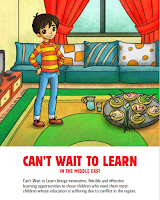Whose reality counts? The donors or the beneficiaries?

I have spent over 15 years in the field of teaching, teacher training and school management. I have been interested in observing and understanding how do educational initiatives make a difference in people's lives. When I decided to do my PhD research, it was clear for me That will study issues related to the impact of education on people's lives, well-being and status. This opened my eyes to the concept of “Empowerment”. Empowerment, a buzzword that has been used and sometimes overused, especially in the field of international development. But to clear my mind from all the tens of definitio, I decided to stick to the World Bank definition: “the capacity of individuals or groups to make purposeful and effective choices in the interest of pursuing a better life for themselves” (Walton, 2003, p.3). Empowerment is a complex term with endless interpretations, due to its multi-contextual (political, socio-cultural, economic…) and multi-dimensional (individual, community,...










